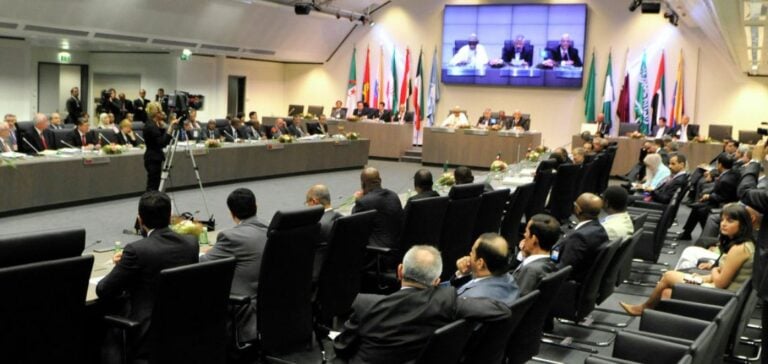OPEC has lowered its forecasts for global oil demand over the coming years, impacted by a slowdown in economic growth and continued production increases by its rivals.
According to the monthly report published on September 10, global demand should grow by 2 million barrels per day (b/d) in 2024, 80,000 b/d less than forecast in August.
For 2025, demand is adjusted to 1.7 million b/d, a reduction of 40,000 b/d on previous estimates.
Impact on OPEC+ volume requirements
The “call on OPEC+ crude”, the volume that the alliance must produce to balance the market, has also been revised downwards.
It is set at 42.8 million b/d for 2024, with a reduction of 100,000 b/d, and 43.4 million b/d for 2025, down by 200,000 b/d.
These revisions come against a backdrop of falling oil prices, with Brent crude reaching $72.13 a barrel, its lowest level for 17 months.
The alliance decided to postpone the 180,000 b/d production increase originally scheduled for October to December.
In August, OPEC+ production fell to 40.66 million b/d, down 304,000 b/d on July.
This was mainly due to disruptions in Libya and maintenance work in Kazakhstan.
Non-OPEC+ production outlook
Despite the adjustments to demand forecasts, OPEC maintains its position on non-OPEC+ supply growth.
The organization anticipates an increase of 1.2 million b/d in 2024 to 53.1 million b/d, and of 1.1 million b/d in 2025 to 54.2 million b/d.
US production is expected to make a significant contribution to this growth, with an increase of 510,000 b/d in 2024 and 500,000 b/d in 2025.
Tensions over quota compliance
Production quotas remain a major point of tension within OPEC+.
Iraq, for example, produced 4.228 million b/d in August, exceeding its quota of 4 million b/d.
Despite commitments to reduce this overproduction, the situation remains under scrutiny.
Kazakhstan, meanwhile, adjusted its production to 1.450 million b/d, in line with its quota, following maintenance work.
Russia, also under pressure to reduce production, produced 9.059 million b/d in August, above its quota of 8.978 million b/d.
The Joint Ministerial Monitoring Committee (JMMC) will meet again on October 2 to assess the market situation and verify compliance with its members’ quotas.
Strategic adaptations in a volatile market
OPEC+ is faced with a constantly changing market, marked by oversupply and fluctuating prices.
Quota management and coordination between members will be crucial in the coming months to stabilize the market and respond to external pressures.
Production adjustments, ongoing negotiations and global demand forecasts are key factors in the alliance’s future strategy.






















